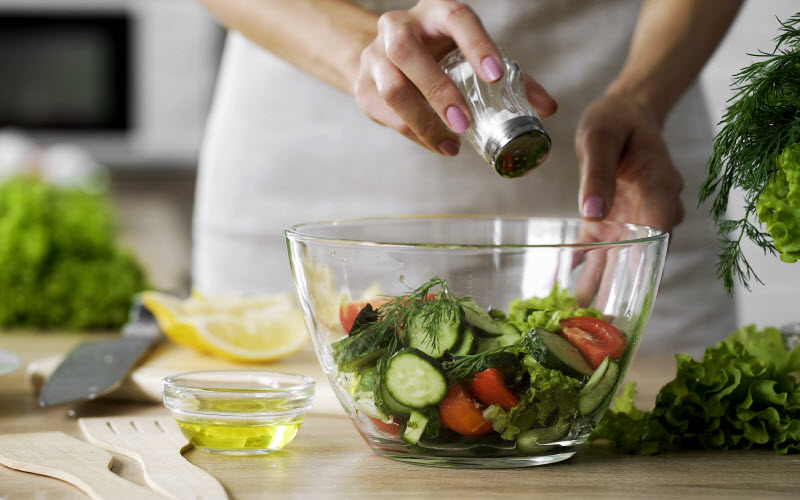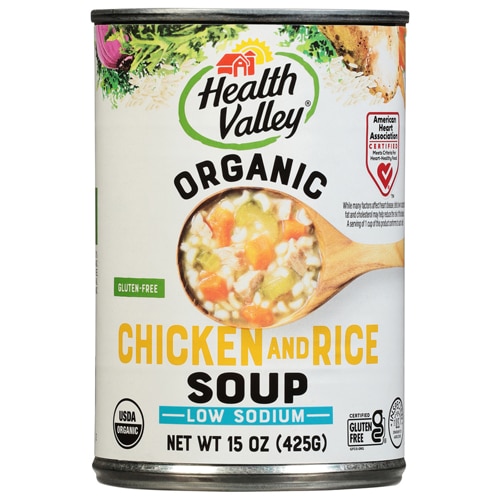[vc_row][vc_column][vc_column_text]Does
consuming less sodium protect your heart? The latest research offers a mixed take on that age-old nugget of wisdom.
A
low-sodium diet does indeed reduce key symptoms in those with heart issues, including swelling, fatigue and coughing, and thus improves quality of life, according to research reported last month at the American College of Cardiology's 71
st Annual Scientific Session.
However, reducing sodium intake does not prevent hospital visits or death in those with heart failure, researchers found.
The study results are important, because they stem from what was the largest-ever randomized clinical trial examining the relationship between reducing sodium intake and heart failure.

In a
press release, the study's lead author -- Dr. Justin Ezekowitz, a cardiologist and professor in the University of Alberta's Faculty of Medicine & Dentistry -- says the findings should reshape expectations about what a low-sodium diet can achieve in those with heart issues.
"We can no longer put a blanket recommendation across all patients and say that limiting sodium intake is going to reduce your chances of either dying or being in hospital, but I can say comfortably that it could improve people's quality of life overall," Ezekowitz says.
The effects of too much sodium
The study findings don't mean you should throw up your hands and succumb to a diet of movie-theater popcorn and take-out pizzas, however.
There is still clear evidence that consuming too much sodium is not good for your health, says
Erin Palinski-Wade, a New Jersey-based registered dietitian and author of "2-Day Diabetes Diet."
"Excessive sodium in the diet can increase the risk of hypertension due to fluid retention in the body," Palinski-Wade says. "This is especially true for people with declining kidney function."
High levels of sodium also are associated with greater risk of:
- Heart disease
- Stroke
- Loss of calcium in the body
The importance of sodium in your diet
But sodium itself is not evil. In proper amounts, sodium plays a vital role in keeping you healthy.
“Sodium is a necessary electrolyte, and without enough sodium in the diet, you may experience muscle cramps, dizziness (and) a dangerous drop in blood pressure,” Palinski-Wade says. “In extreme cases, a severe electrolyte imbalance can even be fatal.”
Iodized salt also is one of the main sources of iodine in our diets. Iodine plays an important role in thyroid function.
“A lack of iodine in the diet can lead to fatigue, weight gain, and even changes in heart rate,” Palinski-Wade says. “So, taking in enough dietary sodium daily is essential.”
Getting the right amount of sodium
The key with sodium is to get the right amount into your diet – not too much, and not too little.
The
Academy of Nutrition and Dietetics notes that most people ages 14 and older should limit their sodium intake to less than 2,300 milligrams per day.
One way to keep your sodium levels in better balance is to avoid processed foods.
“One of the biggest sources of added sodium in the diet comes from processed and prepared foods,” Palinski-Wade says.
Reducing your intake of ultra-processed foods can go a long way in reducing overall sodium intake, she says. Whenever possible, read food labels and choose snack and meal options with less added sodium.
Preparing your own meals is a great way to lower your exposure to sodium, but only if you cook your foods in a healthful manner.
“When cooking, limit the use of the salt shaker and flavor foods with low-sodium seasonings instead,” Palinski-Wade says.
The Academy of Nutrition and Dietetics recommends some additional ways to get enough sodium without taking in too much. They include:
- Consuming natural sources of potassium, including more fruits and vegetables
- Eating more whole grains, including brown rice, quinoa, oats, bulgur, whole-wheat pasta and bread, wild rice and popcorn
- Choosing plant-based protein sources, such as beans and peas
- Snacking on unsalted nuts instead of crackers and chips
[/vc_column_text][/vc_column][/vc_row][vc_row][vc_column][vc_text_separator title="Featured Products" border_width="2"][vc_row_inner equal_height="yes" content_placement="middle" gap="35"][vc_column_inner width="1/3"][vc_single_image image="160108" img_size="full" alignment="center" onclick="custom_link" img_link_target="_blank" css=".vc_custom_1653600879537{padding-right: 7% !important;padding-left: 7% !important;}" link="https://www.vitacost.com/selina-naturally-organic-all-purpose-seasoning-with-a-hint-of-celtic-sea-salt"][/vc_column_inner][vc_column_inner width="1/3"][vc_single_image image="160107" img_size="full" alignment="center" onclick="custom_link" img_link_target="_blank" css=".vc_custom_1653600915509{padding-right: 7% !important;padding-left: 7% !important;}" link="https://www.vitacost.com/maine-coast-sea-vegetables-organic-kelp-granules-salt-alternative"][/vc_column_inner][vc_column_inner width="1/3"][vc_single_image image="160106" img_size="full" alignment="center" onclick="custom_link" img_link_target="_blank" css=".vc_custom_1653600946649{padding-right: 7% !important;padding-left: 7% !important;}" link="https://www.vitacost.com/imagine-foods-organic-low-sodium-vegetable-broth"][/vc_column_inner][/vc_row_inner][/vc_column][/vc_row]
 In a press release, the study's lead author -- Dr. Justin Ezekowitz, a cardiologist and professor in the University of Alberta's Faculty of Medicine & Dentistry -- says the findings should reshape expectations about what a low-sodium diet can achieve in those with heart issues.
"We can no longer put a blanket recommendation across all patients and say that limiting sodium intake is going to reduce your chances of either dying or being in hospital, but I can say comfortably that it could improve people's quality of life overall," Ezekowitz says.
In a press release, the study's lead author -- Dr. Justin Ezekowitz, a cardiologist and professor in the University of Alberta's Faculty of Medicine & Dentistry -- says the findings should reshape expectations about what a low-sodium diet can achieve in those with heart issues.
"We can no longer put a blanket recommendation across all patients and say that limiting sodium intake is going to reduce your chances of either dying or being in hospital, but I can say comfortably that it could improve people's quality of life overall," Ezekowitz says.



